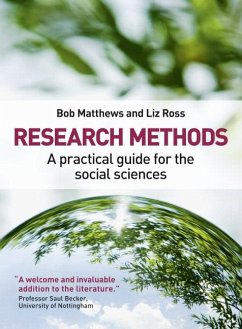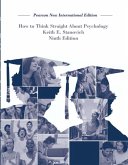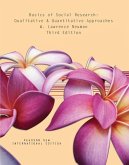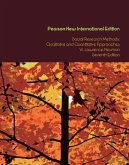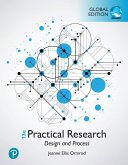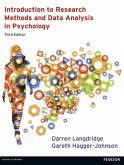Research Methods: A Practical Guide for the Social Sciences is an essential resource for the social researcher. It offers a comprehensive introduction for first time researchers right through to thorough and practical advice for those undertaking more advanced work. The book draws on real life experiences from a wide variety of disciplines to show how theory translates into practice, and offers a rigorous analysis of why researchers choose the methods they use. Think about it boxes throughout the text offer questions and ideas to help the researcher to focus on core issues and practical considerations, whilst your research summaries present questions, activities and checklists to help the researcher to develop their ideas.
The book is supported by a fantastic companion website that contains learning materials, interactive exercises, videos, questionnaires, datasets and much more. The website can be found at: www.pearsoned.co.uk/matthews
Written to reflect the breadth of the social sciences, Research Methods is essential for anyone conducting research in sociology, health policy, social work, criminology, social policy, cultural studies, political studies, public policy and related fields.
Product Description
Research Methods: A Practical Guide for the Social Sciences is an essential resource for the social researcher. It offers a comprehensive introduction for first time researchers right through to thorough and practical advice for those undertaking more advanced work. The book draws on real life experiences from a wide variety of disciplines to show how theory translates into practice, and offers a rigorous analysis of why researchers choose the methods they use. Think about it boxes throughout the text offer questions and ideas to help the researcher to focus on core issues and practical considerations, whilst your research summaries present questions, activities and checklists to help the researcher to develop their ideas.
The book is supported by a fantastic companion website that contains learning materials, interactive exercises, videos, questionnaires, datasets and much more. The website can be found at: www.pearsoned.co.uk/matthews
Written to reflect the breadth of the social sciences, Research Methods is essential for anyone conducting research in sociology, health policy, social work, criminology, social policy, cultural studies, political studies, public policy and related fields.
Features + Benefits
Examples drawn from real life show you how theory translates into practice.
Real research from a wide variety of disciplines lets you see your project in context.
Think about it boxes offer questions and ideas to help you focus on core issues and practical considerations.
Your research summaries present questions, activities and checklists to help you develop your ideas.
What is ? boxes provide definitions and explanations of key terms.
Backcover
A lively and accessible, practical guide on how to do social research. It takes the reader on a journey, from initial thoughts and questions through to the complexities of data collection, analysis and dissemination. A welcome and invaluable addition to the literature on research methods.
Professor Saul Becker, Head of the School of Sociology and Social Policy, The University of Nottingham
A seminal textbook, glittering with extensive examples, information and insight which publicise the entire research process from a new and engaging perspective.
Faiza Qureshi, Loughborough University
Accessible to new researchers without losing the essence of highly complex issues. In short, a valuable tool for those seeking to mobilise research projects for the first time or those seeking to refresh and update knowledge of current research issues.
Dave Orr, University of Central Lancashire
Whether you are doing social research for the first time, or taking on more advanced work, Research Methods: A Practical Guide for the Social Sciences will inform and improve your understanding and practice.
More than a comprehensive practical guide, this book also offers a rigorous analysis of why researchers choose the methods they use. Drawing upon academic and professional sources, Research Methods demonstrates how theory underpins practice and helps you select the most appropriate techniques for collecting data and analysing your findings while remaining ethically and culturally sensitive.
Matthews and Ross pay particular attention to the areas students find most challenging. With a visual guide to using SPSS and Excel in data analysis and an extensive look at data presentation, this book supports the student researcher throughout every stage of the research process.
Written to reflect the breadth of the social sciences, Research Methods is essential for anyone conducting research in sociology, health policy, social work, criminology, social policy, cultural studies, political studies, public policy, education and related fields.
Key features
Examples drawn from real life show you how theory translates into practice.
Real research from a wide variety of disciplines lets you see your project in context.
Think about it . . . boxes offer questions and ideas to help you focus on core issues and practical considerations.
Your research summaries present questions, activities and checklists to help you develop your ideas.
What is ? definitions provide additonal explanations of key terms.
About the authors
Bob Matthews is Lecturer in Social Policy at the University of Birmingham, UK. Bob currently teaches and researches in Comparative Social Policy, Social Inclusion, Health Policy and Research Methods.
Liz Ross is Lecturer in Social Policy at the University of Birmingham, UK. Liz has taught social research methods on both undergraduate and postgraduate programmes, and is Programme Co-ordinator of Birminghams MA Policy into Practice.
Visit the Research Methods: A Practical Guide for the Social Sciences website at www.pearsoned.co.uk/matthews to find learning materials, including interactive exercises, videos, questionnaires, datasets and much more.
Introduction
PART A: Thinking About Research
A1: What is Research?
A2: Knowledge, Theories, Paradigms and Perspectives
A3: The Nature of Data
A4: Research Questions, Hypotheses and Operational Definitions
A5: Research as an Ethical and Cultural Issue
PART B: Preparing for Research
B1: Planning a Research Project
B2: Reviewing the Literature
B3: Research Design
B4: Choosing Methods
B5: Sampling
B6: Research Proposals
PART C: Data Collection
C1: Collecting Data
C2: Data Collection Skills
C3: Questionnaires
C4: Semi-structured Interviews
C5: Focus Groups
C6: Observation
C7: Narrative Data
C8: Documents
C9: Secondary Sources of Data
C10: Collecting Data Using Computer Mediated Communication (CMC)
PART D: Data Analysis
D1: Beginning to Analyse
D2: Working With Data
D3: Statistical Analysis
D4: Thematic Analysis
D5: Analysing Narrative
D6: Discourse Analysis
D7: Content Analysis
D8: Grounded Theory
D9: Using Computers in Data Analysis
D10: So What? Drawing Conclusions
PART E: Data Presentation and Reports
E1: The Importance of Audience
E2: Writing for Research: Reports and Dissertations
E3: Data Presentation
E4: Dissemination and Further Research
Glossary
Research Methods: A Practical Guide for the Social Sciences is an essential resource for the social researcher. It offers a comprehensive introduction for first time researchers right through to thorough and practical advice for those undertaking more advanced work. The book draws on real life experiences from a wide variety of disciplines to show how theory translates into practice, and offers a rigorous analysis of why researchers choose the methods they use. Think about it boxes throughout the text offer questions and ideas to help the researcher to focus on core issues and practical considerations, whilst your research summaries present questions, activities and checklists to help the researcher to develop their ideas. The book is supported by a fantastic companion website that contains learning materials, interactive exercises, videos, questionnaires, datasets and much more. The website can be found at: www.pearsoned.co.uk/matthews Written to reflect the breadth of the social sciences, Research Methods is essential for anyone conducting research in sociology, health policy, social work, criminology, social policy, cultural studies, political studies, public policy and related fields.
Hinweis: Dieser Artikel kann nur an eine deutsche Lieferadresse ausgeliefert werden.
The book is supported by a fantastic companion website that contains learning materials, interactive exercises, videos, questionnaires, datasets and much more. The website can be found at: www.pearsoned.co.uk/matthews
Written to reflect the breadth of the social sciences, Research Methods is essential for anyone conducting research in sociology, health policy, social work, criminology, social policy, cultural studies, political studies, public policy and related fields.
Product Description
Research Methods: A Practical Guide for the Social Sciences is an essential resource for the social researcher. It offers a comprehensive introduction for first time researchers right through to thorough and practical advice for those undertaking more advanced work. The book draws on real life experiences from a wide variety of disciplines to show how theory translates into practice, and offers a rigorous analysis of why researchers choose the methods they use. Think about it boxes throughout the text offer questions and ideas to help the researcher to focus on core issues and practical considerations, whilst your research summaries present questions, activities and checklists to help the researcher to develop their ideas.
The book is supported by a fantastic companion website that contains learning materials, interactive exercises, videos, questionnaires, datasets and much more. The website can be found at: www.pearsoned.co.uk/matthews
Written to reflect the breadth of the social sciences, Research Methods is essential for anyone conducting research in sociology, health policy, social work, criminology, social policy, cultural studies, political studies, public policy and related fields.
Features + Benefits
Examples drawn from real life show you how theory translates into practice.
Real research from a wide variety of disciplines lets you see your project in context.
Think about it boxes offer questions and ideas to help you focus on core issues and practical considerations.
Your research summaries present questions, activities and checklists to help you develop your ideas.
What is ? boxes provide definitions and explanations of key terms.
Backcover
A lively and accessible, practical guide on how to do social research. It takes the reader on a journey, from initial thoughts and questions through to the complexities of data collection, analysis and dissemination. A welcome and invaluable addition to the literature on research methods.
Professor Saul Becker, Head of the School of Sociology and Social Policy, The University of Nottingham
A seminal textbook, glittering with extensive examples, information and insight which publicise the entire research process from a new and engaging perspective.
Faiza Qureshi, Loughborough University
Accessible to new researchers without losing the essence of highly complex issues. In short, a valuable tool for those seeking to mobilise research projects for the first time or those seeking to refresh and update knowledge of current research issues.
Dave Orr, University of Central Lancashire
Whether you are doing social research for the first time, or taking on more advanced work, Research Methods: A Practical Guide for the Social Sciences will inform and improve your understanding and practice.
More than a comprehensive practical guide, this book also offers a rigorous analysis of why researchers choose the methods they use. Drawing upon academic and professional sources, Research Methods demonstrates how theory underpins practice and helps you select the most appropriate techniques for collecting data and analysing your findings while remaining ethically and culturally sensitive.
Matthews and Ross pay particular attention to the areas students find most challenging. With a visual guide to using SPSS and Excel in data analysis and an extensive look at data presentation, this book supports the student researcher throughout every stage of the research process.
Written to reflect the breadth of the social sciences, Research Methods is essential for anyone conducting research in sociology, health policy, social work, criminology, social policy, cultural studies, political studies, public policy, education and related fields.
Key features
Examples drawn from real life show you how theory translates into practice.
Real research from a wide variety of disciplines lets you see your project in context.
Think about it . . . boxes offer questions and ideas to help you focus on core issues and practical considerations.
Your research summaries present questions, activities and checklists to help you develop your ideas.
What is ? definitions provide additonal explanations of key terms.
About the authors
Bob Matthews is Lecturer in Social Policy at the University of Birmingham, UK. Bob currently teaches and researches in Comparative Social Policy, Social Inclusion, Health Policy and Research Methods.
Liz Ross is Lecturer in Social Policy at the University of Birmingham, UK. Liz has taught social research methods on both undergraduate and postgraduate programmes, and is Programme Co-ordinator of Birminghams MA Policy into Practice.
Visit the Research Methods: A Practical Guide for the Social Sciences website at www.pearsoned.co.uk/matthews to find learning materials, including interactive exercises, videos, questionnaires, datasets and much more.
Introduction
PART A: Thinking About Research
A1: What is Research?
A2: Knowledge, Theories, Paradigms and Perspectives
A3: The Nature of Data
A4: Research Questions, Hypotheses and Operational Definitions
A5: Research as an Ethical and Cultural Issue
PART B: Preparing for Research
B1: Planning a Research Project
B2: Reviewing the Literature
B3: Research Design
B4: Choosing Methods
B5: Sampling
B6: Research Proposals
PART C: Data Collection
C1: Collecting Data
C2: Data Collection Skills
C3: Questionnaires
C4: Semi-structured Interviews
C5: Focus Groups
C6: Observation
C7: Narrative Data
C8: Documents
C9: Secondary Sources of Data
C10: Collecting Data Using Computer Mediated Communication (CMC)
PART D: Data Analysis
D1: Beginning to Analyse
D2: Working With Data
D3: Statistical Analysis
D4: Thematic Analysis
D5: Analysing Narrative
D6: Discourse Analysis
D7: Content Analysis
D8: Grounded Theory
D9: Using Computers in Data Analysis
D10: So What? Drawing Conclusions
PART E: Data Presentation and Reports
E1: The Importance of Audience
E2: Writing for Research: Reports and Dissertations
E3: Data Presentation
E4: Dissemination and Further Research
Glossary
Research Methods: A Practical Guide for the Social Sciences is an essential resource for the social researcher. It offers a comprehensive introduction for first time researchers right through to thorough and practical advice for those undertaking more advanced work. The book draws on real life experiences from a wide variety of disciplines to show how theory translates into practice, and offers a rigorous analysis of why researchers choose the methods they use. Think about it boxes throughout the text offer questions and ideas to help the researcher to focus on core issues and practical considerations, whilst your research summaries present questions, activities and checklists to help the researcher to develop their ideas. The book is supported by a fantastic companion website that contains learning materials, interactive exercises, videos, questionnaires, datasets and much more. The website can be found at: www.pearsoned.co.uk/matthews Written to reflect the breadth of the social sciences, Research Methods is essential for anyone conducting research in sociology, health policy, social work, criminology, social policy, cultural studies, political studies, public policy and related fields.
Hinweis: Dieser Artikel kann nur an eine deutsche Lieferadresse ausgeliefert werden.

